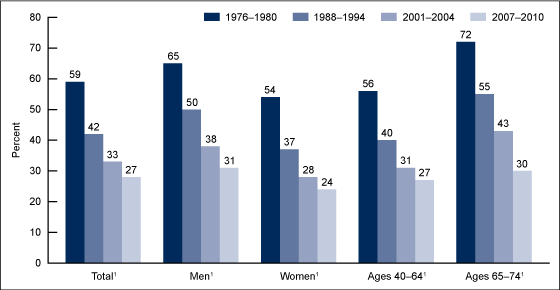Low density lipoprotein epidemiology and demographics
Template:Low density lipoprotein Editor-In-Chief: C. Michael Gibson, M.S., M.D. [1]; Associate Editor(s)-in-Chief: Rim Halaby, M.D. [2]
Overview
Epidemiology and Demographics
Prevalence
Overall, the prevalence of high LDL–C significantly decreased from 59% in 1976–1980 to 42% in 1988–1994, and to 33% in 2001–2004, reaching 27% in 2007–2010. The percentage of adults using cholesterol-lowering medication increased from 5% to 23% from the late 1980s through 2007–2010.
Gender
Between 1976–1980 and 2007–2010, the prevalence of high LDL–C significantly decreased for men from 65% to 31%.
The prevalence of high LDL–C also significantly decreased for and women from 54% to 24% between 1976–1980 and 2007–2010.
Age=
Between 1976–1980 and 2007–2010, the prevalence of high LDL–C significantly decreased for adults aged 40–64 (56% to 27%) and 65–74 (72% to 30%).
Shown below is a diagram depicting the age-adjusted prevalence of high LDL cholesterol among adults aged 40–74, by sex and age in the United States between 1976–1980 and 2007–2010. (Source: CDC/NCHS, National Health and Nutrition Examination Survey.)
